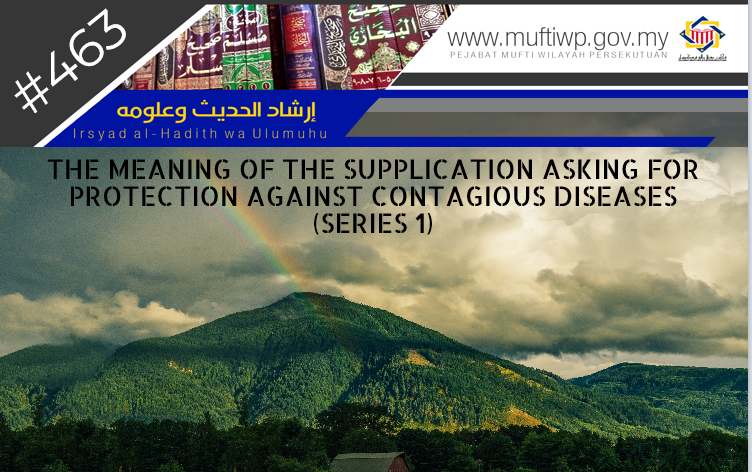Question:
What is the source and meaning of this supplication?
بِسْمِ اللَّهِ الَّذِي لَا يَضُرُّ مَعَ اسْمِهِ شَيْءٌ فِي الْأَرْضِ وَلَا فِي السَّمَاءِ وَهُوَ السَّمِيعُ الْعَلِيمُ،
In the Name of Allah by whose Name nothing in the earth or the heaven is harmed. He is the All-Hearing, the All-Knowing.
Answer:
Alhamdulillah, praise and thanks to Allah for the countless blessings He has blessed us all with. Blessings and salutations to the Prophet Muhammad PBUH, his wives, his family, companions and all those that follow his teachings to the day of judgement.
As believers, we should always supplicate to Allah SWT for humans are created weak and always in need of their Creator in every situation and time. Thus, numerous supplications are taught to us by the Messenger PBUH for our daily lives. According to the above question, here, we include the source and summarized meaning of the supplication:
- From Uthman bin Affan RA, he heard the Prophet PBUH said:
مَنْ قَالَ بِسْمِ اللَّهِ الَّذِي لَا يَضُرُّ مَعَ اسْمِهِ شَيْءٌ، فِي الْأَرْضِ، وَلَا فِي السَّمَاءِ، وَهُوَ السَّمِيعُ الْعَلِيمُ، ثَلَاثَ مَرَّاتٍ، لَمْ تُصِبْهُ فَجْأَةُ بَلَاءٍ، حَتَّى يُصْبِحَ، وَمَنْ قَالَهَا حِينَ يُصْبِحُ ثَلَاثُ مَرَّاتٍ، لَمْ تُصِبْهُ فَجْأَةُ بَلَاءٍ حَتَّى يُمْسِيَ
Whoever recites: "In the name of Allah, when Whose name is mentioned nothing on Earth or in Heaven can cause harm, and He is the Hearer, the Knower" he will not suffer sudden affliction till the morning, and if anyone says this in the morning, he will not suffer sudden affliction till the evening.”
Source and Status of Hadith
This hadith is narrated by Uthman bin Affan RA and it is narrated by Imam Abu Daud in his Sunan (5088). Syeikh Syuaib al-Arna’outh evaluated the hadith as hasan when he reviewed the hadiths in Sunan Abu Daud which includes this hadith. This supplication is also narrated by Imam al-Tirmizi in his Sunan (3388) and he evaluated the hadith as hasan sahih gharib. Whereas, it is also narrated by Imam Ibn Majah in his Sunan (3869) with a second matan (text of the hadith) (narrated by al-Tirmizi and Ibn Majah) with a slight difference, which is:
مَا مِنْ عَبْدٍ يَقُولُ فِي صَبَاحِ كُلِّ يَوْمٍ وَمَسَاءِ كُلِّ لَيْلَةٍ: بِسْمِ اللَّهِ الَّذِي لَا يَضُرُّ مَعَ اسْمِهِ شَيْءٌ فِي الأَرْضِ وَلَا فِي السَّمَاءِ، وَهُوَ السَّمِيعُ العَلِيمُ ثَلَاثَ مَرَّاتٍ، فَيَضُرَّهُ شَيْءٌ
“None of a slave who recites "In the name of Allah, when Whose name is mentioned nothing on Earth or in Heaven can cause harm, and He is the Hearer, the Knower" three times every morning and night will be harmed by anything.”
Imam al-Hafiz Ibn Hajar al-Asqalani evaluate this narration (Narration by al-Tirmizi and Ibn Majah) in his book as hasan sahih. [See: Nata’ij al-Afkar, 2/367]. Furthermore, Imam Ahmad also narrated the hadith in his Musnad (474) and Syiekh Syu’aib al-Arna’outh evaluate the sanad of the hadith as hasan when reviewing this hadith in Musnad Ahmad:
مَنْ قَالَ فِي أَوَّلِ يَوْمِهِ، أَوْ فِي أَوَّلِ لَيْلَتِهِ: بِسْمِ اللهِ الَّذِي لَا يَضُرُّ مَعَ اسْمِهِ شَيْءٌ فِي الْأَرْضِ وَلا فِي السَّمَاءِ، وَهُوَ السَّمِيعُ الْعَلِيمُ، ثَلاثَ مَرَّاتٍ، لَمْ يَضُرَّهُ شَيْءٌ فِي ذَلِكَ الْيَوْمِ، أَوْ فِي تِلْكَ اللَّيْلَةِ
“Whoever recite it in the early morning and the beginning of the night: In the name of Allah who does not harm anything with His name in the heavens and earth. And He is the All-Hearing and the All-Knowing three times, surely will not be harmed by anything through the day and night.”
Hence, in our opinion, the hadith is hasan because in the sanad of the hadith, there is a narrator known as Abi al-Zinad whose name is Abd al-Rahman and the supplication is permissible to be recited in our daily lives asking to be protected from disaster, contagious diseases, hardship and others. Furthermore, we are permissible to supplicate with any type of supplication even if it is not stated in the Quran or sunnah as long as it does not contradict with the religion.
The Meaning of the Hadith
In the hadith, the advantages of those who recite this supplication at the break of dawn and the beginning of night. The supplication begins with the name of Allah and asking to be protected from any harmful matters in the name of Allah recited with the correct intention and sincerity. However, we are not only asking protection from the harms on earth but also from the heavens. Furthermore, Allah SWT is the All-Hearing and will hear our cries and Allah SWT is also the All-Knowing regarding each our situations. [See: Tuhfah al-Ahwazi, 9/234]
Moreover, there is no harm with His name in this hadith means, people and creations on earth are safe due to the blessing of His name and their relation with Him. The same goes for the people and creations of the heaven who always recite the name of Allah. [See: Syarh Hisn al-Muslim, 149]
Conclusion
To conclude, supplication is not simply a request, but also a form of worship and sign that a slave is weak for in the dua they stated their khudhu’ (obedience), tazallul (humility) and iftiqar (need) towards Allah SWT. Lastly, may Allah SWT protect us from any bad things from the heavens and earth. Amin.
Wallahua'lam


